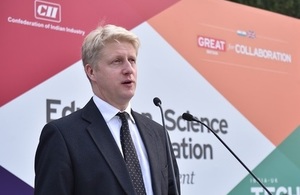Science Minister announces £80 million UK-India research investments
Science Minister Jo Johnson has announced a number of new UK-India Newton Fund programmes.

Johnson Minister of State for Universities Science, Research and Innovation
- new UK-India Newton Fund programmes worth £80 million will address a range of global challenges through technology and science
- Science Minister confirms the joint investment will increase to £200 million by 2021
- annual £1 million Newton Prize launched for 2017 to reward science and innovation to support public health
The UK Science Minister has today (8 November 2016) announced a series of research programmes from the Newton Fund worth up to £80 million to address global challenges affecting people in India.
The investments were announced during an event at the India-UK Tech Summit in New Delhi – India’s premier science and technology showcase. The UK and Indian Prime Ministers Theresa May and Narendra Modi attended the Tech Summit that brought together British businesses, science and technology experts to India, exhibiting UK excellence across these sectors.
The new programmes take the total joint UK-India investment in research through the Newton Fund up to £200 million by 2021, demonstrating the fund as a major bilateral initiative in India. It brings together the world class excellence of the UK and India to address global challenges through science and technology.
Science Minister Jo Johnson announced a number of the new UK-India Newton Fund programmes at the Education, Science and Innovation Futures event, attended by world-leading scientists and senior research policy leaders. These were:
- £16 million programme to support commercially focused research and development partnerships that bring innovative biotechnologies to market for cleaning, processing and using industrial waste streams (Research Councils UK - RCUK)
- £8.4 million programme to improve water quality (RCUK)
- £7.4 million programme on energy demand reduction in the built environment to improve health and wellbeing and lower energy costs for building users (RCUK)
- £12.6 million launch of phase 2 of Global Research Programme in Women and Children’s Health between the UK and India to study reproductive health issues facing women and their unborn children in low and middle income countries (RCUK)
- £13 million UK-India research programme to strengthen the global fight against anti-microbial resistance, announced during the opening of the first RCUK-DBT Strategic Group on AMR on 9 November (RCUK)
Universities and Science Minister Jo Johnson said:
The future of science and innovation depends on collaboration and India continues to be a vital science partner for the UK.
Through the Newton Fund we’re working together to improve the lives of millions across the world and we are continuing to look at opportunities to expand this partnership to include joint funding for social science and humanities programmes.
During the event, Jo Johnson launched the first annual £1 million Newton Prize, which will recognise the Newton Fund’s best science or innovation that promotes the economic development and social welfare of partner countries. For 2017, the Prize is open to existing Newton Fund programmes in India, Malaysia, Thailand and Vietnam which focus on the challenges of public health and wellbeing, covering issues such as, anti-microbial resistance, disease, healthcare, and nutrition.
The Minister also celebrated a significant programme to digitise the vast wealth of Indian printed books held by the British Library dating from 1713 to 1914. Two Centuries of Indian Print - a British Library project funded by the Newton Fund through the Arts and Humanities Research Council (AHRC) – has been extended to digitise an additional 3,000 books from the collection, meaning that 4,000 early Bengali books will be digitised and made accessible to researchers around the world.
Notes to editors
- Further details on the new programmes are available from Research Councils UK and Innovate UK. Other new UK-India Newton Fund programmes will be delivered by UK delivery partners, including the British Council and the UK Academies, in collaboration with Indian partners.